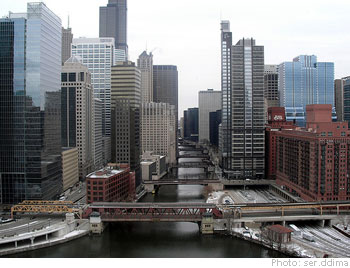 The Chicago Tribune has widely publicized the fact, as of 2008, Chicago had the highest sales tax in the country (10.25%, with Memphis, TN in second place with 9.25%), thanks to a vote in early 2008 doubling of the Cook County portion of that tax (the city of Chicago is located in Cook County).
The Chicago Tribune has widely publicized the fact, as of 2008, Chicago had the highest sales tax in the country (10.25%, with Memphis, TN in second place with 9.25%), thanks to a vote in early 2008 doubling of the Cook County portion of that tax (the city of Chicago is located in Cook County).
What pushed Chicago taxes up? Even as a recession began? Why has it not yet been reversed, even as the recession has obviously deepened?
It’s easy to claim, as a number of Tribune editorials did, that the sales tax hike was a bad idea unfortunately and inexplicably hatched by Cook County Board President Todd Stroger, which would have been avoided if some combination of voters, politicians, and bureaucrats had better economic educations.
I agree that the sales tax hike was a bad idea, and believe that the citizens of Cook County would have been better off without it. [I also support mandating University of Chicago educations for Cook County Board members.] But above explanation has a glaring logical flaw: Cook County Board members’ economic educations — however good or bad they may be — did not suddenly get worse in 2008. For some reason, President Stroger and his supporters once thought that a sales tax rate less than 10% for Chicago was OK.
Although he may not know it, Chicago Tribune correspondent Greg Burns gives a much better answer in his column today.
Like most cities, Chicago has competed for it citizens. Over the years, citizens have come thanks to its amenities — we love our lakefront — and have left because of crime, schools, and taxes.
But the nature of that competition dramatically changed since 2006. The Burns article explains how many fewer citizens are leaving Cook County for Will and Dupage counties, in large part because of the immobility created by falling real estate prices (Chicago real estate prices had some of their steepest drops in late 2007) and tough job market.
Did Cook County government sense in early 2008 that their tax base was more captive than usual? And that a captive tax base is ripe for heavy taxation? I think it’s a big part of the story.
This story also explains why, despite a noble effort by Cook County Commissioner Tony Peraica and changes of heart by some key politicians, the Cook County sales tax hike has not yet been reversed: the Cook County tax base remains as captive as ever. Real estate prices are lower, and the job market tougher, than when the Board passed the hike. Maybe we should consider ourselves lucky that the Cook County sales tax was not hiked yet again!
That leads me to a prediction: when Cook County residents become mobile again (I guarantee that will happen eventually), Chicago will cease to be the highest sales tax locale in America. And likely Chicago will relinquish its tax leader status via a rollback of the infamous Cook County Hike of 2008.
Photo: ser.ddima
Disclaimer: This page contains affiliate links. If you choose to make a purchase after clicking a link, we may receive a commission at no additional cost to you. Thank you for your support!


I will tell you why. The Cook County Board gave all employees a Cost of Living Increase. They voted 17-0 while then CFO Donna Dunnings warned them that there was no money to cover raises. Since there is no way to cut $300,000,000 in a few days, the 1 penny on a dollar was enacted. What is crazy here in Illinois is that Cook County has a balanced budget for the last 4 years, all while Mayor Daley is selling off assets and STILL has a $500,000,000 deficit. The State led by Pat Quinn and Mike Madigan has a 12,000,000,000 deficit. Both have raised sales taxes and property taxes SINCE Stroger 1 penny. Its racial politics. The question is why is the Cook tax “infamous” as even you put it Why isnt the 5 cent per bottle water tax (Daley)viewed the same way. Or the “sugar” tax enacted by Quinn and Madigan. And thier governments ARE STILL IN DEBT.
September 26, 2007 – Cook County Board President Todd H. Stroger’s office released numbers for Cook County’s proposed 2008 deficit today, which is projected to be $307 million.
“Between our structural deficit and additional financial obligations for FY 2008, it becomes clear that there is a dire need for new revenue to address our financial obligations,” said County Board President Todd H. Stroger.
“This budget deficit includes a $157 million increase in expenditures and a $150 million reduction in revenue,” says Cook County Chief Financial Officer Donna Dunnings. “48% is generated by employee-related costs that have been approved by the County Board.”
County officials assert that if it weren’t for improvements in areas like the Bureau of Health Services’ billing system and prescription drug co-pays, the deficit would have been larger.
Earlier this week, the Center for Tax and Budget Accountability released a report which estimated that Cook County’s structural deficit for 2008 – not including COLA’s and other contractual obligations – was expected to top $288 million.
The County asked the CTBA to analyze the level of County expenses for core services compared to the level of revenue the County can collect to pay for those core services.
The report’s principal finding is that the County’s annual revenue growth falls far short of annual expenditure growth, taking into account only inflation and holding public services at 2007 levels into the future.